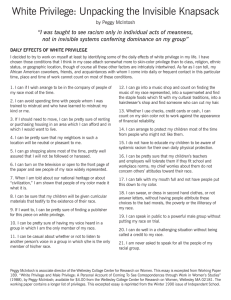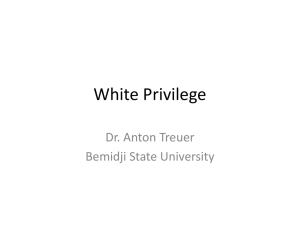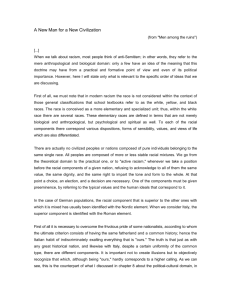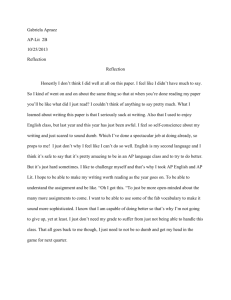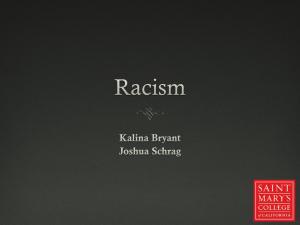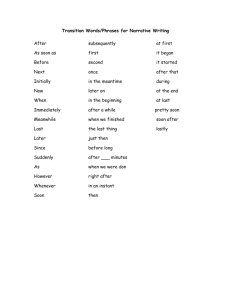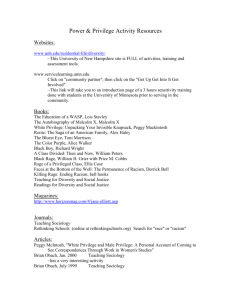White Privilege.doc - Friends Meeting of San Antonio
advertisement
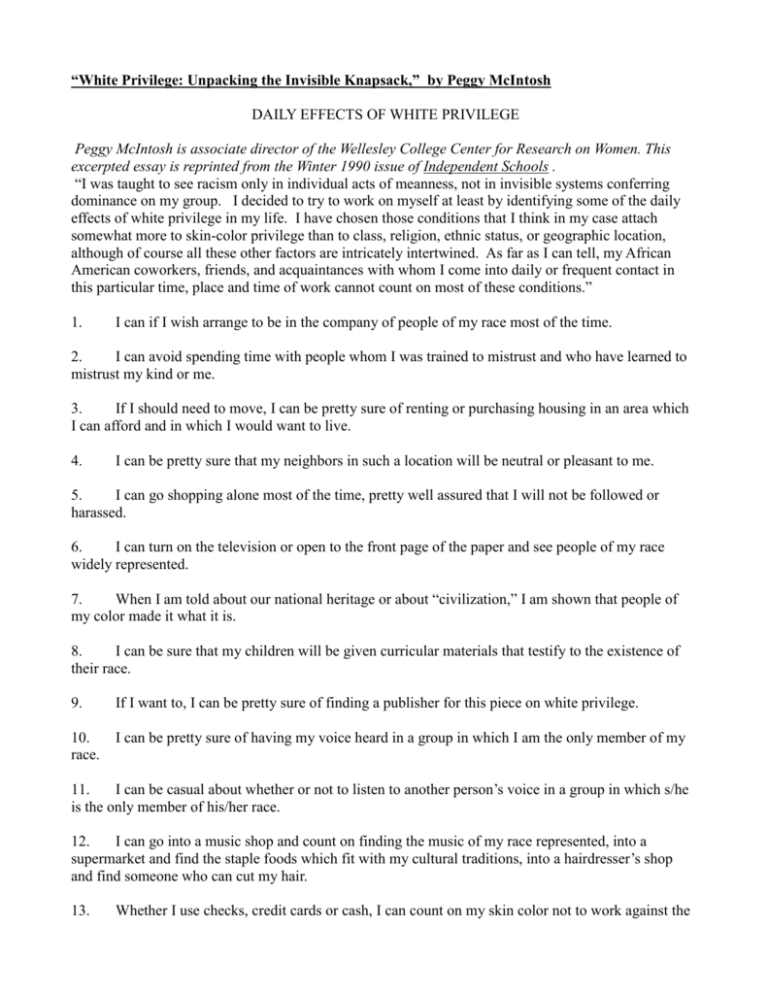
“White Privilege: Unpacking the Invisible Knapsack,” by Peggy McIntosh DAILY EFFECTS OF WHITE PRIVILEGE Peggy McIntosh is associate director of the Wellesley College Center for Research on Women. This excerpted essay is reprinted from the Winter 1990 issue of Independent Schools . “I was taught to see racism only in individual acts of meanness, not in invisible systems conferring dominance on my group. I decided to try to work on myself at least by identifying some of the daily effects of white privilege in my life. I have chosen those conditions that I think in my case attach somewhat more to skin-color privilege than to class, religion, ethnic status, or geographic location, although of course all these other factors are intricately intertwined. As far as I can tell, my African American coworkers, friends, and acquaintances with whom I come into daily or frequent contact in this particular time, place and time of work cannot count on most of these conditions.” 1. I can if I wish arrange to be in the company of people of my race most of the time. 2. I can avoid spending time with people whom I was trained to mistrust and who have learned to mistrust my kind or me. 3. If I should need to move, I can be pretty sure of renting or purchasing housing in an area which I can afford and in which I would want to live. 4. I can be pretty sure that my neighbors in such a location will be neutral or pleasant to me. 5. I can go shopping alone most of the time, pretty well assured that I will not be followed or harassed. 6. I can turn on the television or open to the front page of the paper and see people of my race widely represented. 7. When I am told about our national heritage or about “civilization,” I am shown that people of my color made it what it is. 8. I can be sure that my children will be given curricular materials that testify to the existence of their race. 9. If I want to, I can be pretty sure of finding a publisher for this piece on white privilege. 10. race. I can be pretty sure of having my voice heard in a group in which I am the only member of my 11. I can be casual about whether or not to listen to another person’s voice in a group in which s/he is the only member of his/her race. 12. I can go into a music shop and count on finding the music of my race represented, into a supermarket and find the staple foods which fit with my cultural traditions, into a hairdresser’s shop and find someone who can cut my hair. 13. Whether I use checks, credit cards or cash, I can count on my skin color not to work against the appearance of financial reliability. 14. I can arrange to protect my children most of the time from people who might not like them. 15. I do not have to educate my children to be aware of systemic racism for their own daily physical protection. 16. I can be pretty sure that my children’s teachers and employers will tolerate them if they fit school and workplace norms; my chief worries about them do not concern others’ attitudes toward their race. 17. I can talk with my mouth full and not have people put this down to my color. 18. I can swear, or dress in second-hand clothes, or not answer letters, without having people attribute these choices to the bad morals, the poverty or the illiteracy of my race. 19. I can speak in public to a powerful male group without putting my race on trial. 20. I can do well in a challenging situation without being called a credit to my race. 21. I am never asked to speak for all the people of my racial group. 22. I can remain oblivious of the language and customs of persons of color who constitute the world’s majority without feeling in my culture any penalty for such oblivion. 23. I can criticize our government and talk about how much I fear its policies and behavior without being seen as a cultural outsider. 24. race. I can be pretty sure that if I ask to talk to the “person in charge,” I will be facing a person of my 25. If a traffic cop pulls me over or if the IRS audits my tax return, I can be sure I haven’t been singled out because of my race. 26. I can easily buy posters, post-cards, picture books, greeting cards, dolls, toys and children’s magazines featuring people of my race. 27. I can go home from most meetings of organizations I belong to feeling somewhat tied in, rather than isolated, out-of-place, outnumbered, unheard, held at a distance or feared. 28. I can be pretty sure that an argument with a colleague of another race is more likely to jeopardize her/his chances for advancement than to jeopardize mine. 29. I can be pretty sure that if I argue for the promotion of a person of another race, or a program centering on race, this is not likely to cost me heavily within my present setting, even if my colleagues disagree with me. 30. If I declare there is a racial issue at hand, or there isn’t a racial issue at hand, my race will lend me more credibility for either position than a person of color will have. 31. I can choose to ignore developments in minority writing and minority activist programs, or disparage them, or learn from them, but in any case, I can find ways to be more protected from negative consequences of any of these choices. 32. My culture gives me little fear about ignoring the perspectives and powers of people of other races. 33. I am not made acutely aware that my shape, bearing or body odor will be taken as a reflection on my race. 34. I can worry about racism without being seen as self-interested or self-seeking. 35. I can take a job with an affirmative action employer without having my co-workers on the job suspect that I got it because of my race. 36. If my day, week or year is going badly, I need not ask of each negative episode or situation whether it had racial overtones. 37. I can be pretty sure of finding people who would be willing to talk with me and advise me about my next steps, professionally. 38. I can think over many options, social, political, imaginative or professional, without wondering whether a person of my race would be accepted or allowed to do what I want to do. 39. I can be late to a meeting without having the lateness reflect on my race. 40. I can choose public accommodations without fearing that people of my race cannot get in or will be mistreated in the places I have chosen. 41. I can be sure that if I need legal or medical help, my race will not work against me. 42. I can arrange my activities so that I will never have to experience feelings of rejection owing to my race. 43. If I have low credibility as a leader I can be sure that my race is not the problem. 44. race. I can easily find academic courses and institutions which give attention only to people of my 45. race. I can expect figurative language and imagery in all of the arts to testify to experiences of my 46. I can choose blemish cover or bandages in “flesh” color and have them more or less match my skin. 47. I can travel alone or with my spouse without expecting embarrassment or hostility in those who deal with us. 48. I have no difficulty finding neighborhoods where people approve of our household. 49. My children are given texts and classes which implicitly support our kind of family unit and do not turn them against my choice of domestic partnership. 50. I will feel welcomed and “normal” in the usual walks of public life, institutional and social. For reflection: In combating racism, children are our real hope.....When black children start out being treated fairly at school, their confidence is bolstered early on, and they learn that they are as good as anyone else... There are some well-meaning teachers, of course, committed to behaving fairly to all their students— but too often they are the exception rather than the rule. When young children are ignored, insulted, and treated as second-class, they learn to feel bad about themselves. Their self-esteem plummets. Sometimes they act out in class simply to get the teacher to give them any attention at all, and a selffulfilling prophecy has been created. ---Annie Barnes, Everyday Racism: A Book for All Americans, 2000. Black political thinking has always oscillated between opposing poles of self-help and outside help. Like the “doublethink” described by George Orwell in 1984, the black mind holds these two contradictory beliefs simultaneously and accepts them both. Most of us want more responsibility and accountability for minorities and the poor, but we also want an active role for government in promoting and protecting rights and opportunities. ---Clarence Page, Showing My Color: Impolite Essays on Race and Identity, 1996. That there is redemption in struggle, and that victory is only one reason for why one fights in this world, only seems to come as a surprise, or rather as a source of discomfort, to white folks. Invariably, it seems it is we in the white community who obsess over our own efficacy and fail to recognize the value of commitment, irrespective of outcome. People of color, on the other hand, never having been burdened with the illusion that the world was their oyster and thus anything they touched could and should turn to gold, usually take a more reserved, and I would say, a healthier, view of the world and the prospects for change. They know...that the thing being fought for, at least if it's worth having, will require more than a part-time effort and will not likely come in the lifetimes of those presently fighting for it. And it is that knowledge that allows a strength and a resolve few members of the dominant majority will ever, can ever, know. ---Tim Wise, White Like Me: Reflections on Race from a Privileged Son, 2005. (On whether it really makes a difference whether Friends are integrated or not): “The question is one of authenticity, and goes to the heart of our beliefs about Quakerism. For if this faith of Friends that we espouse, this way of seeking for the Spirit of Truth, is indeed authentic, it will be able to speak powerfully to all sorts and conditions of folk, whatever their race, their economic status or the cultural context through which they see the world. [If we] accept the notion, however subconsciously, that Quakerism speaks only to certain kinds of people, then we have totally denied its religious validity, its universal spirit, and so we will have reduced Quakerism to the status of a social club with a mild religious overlay.” ---Alison Oldham, New England Yearly Meeting keynote address, 1984. (continued below) Group exercise: What attitudes, understandings, and actions can we take up to replace our White Privilege knapsack with an Anti-Racist knapsack: A. In our homes and social gatherings? B. In our neighborhoods, including our schools? C. In our workplaces and financial institutions? D. In the parts of our wider community where poverty clearly exists? E. In our Friends Meeting? For further reading: Black Like Me, by John Howard Griffin; pub. 1960. White Like Me: Reflections on Race from a Privileged Son, by Tim Wise; pub. 2005. Fit for Freedom, Not for Friendship: Quakers, Arican Americans, and the Myth of Racial Justice, by Donna McDaniel and Vanessa Julye; pub. 2009. Everyday Racism: A Book for All Americans, by Annie S. Barnes; pub. 2000.
